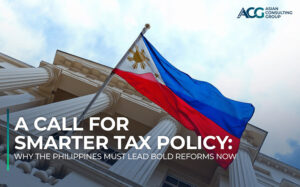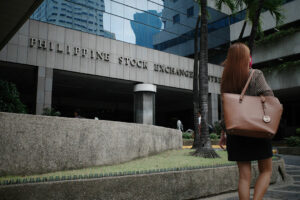
A call for smarter tax policy: Why the Philippines must lead bold reforms now

By Mon Abrea
Chief Tax Advisor, Asian Consulting Group
Following the Philippines’ 2025 State of the Nation Address, I offer this perspective, not as a politician or academic observer, but as someone who has worked closely with taxpayers, policymakers, international experts, and MSMEs to push for reforms that promote inclusive growth, responsible investment, and public trust.
After recently completing a tax policy program at Duke University’s Sanford School of Public Policy and building on past work in collaboration with international institutions and business communities, I believe this is the right time and opportunity to act.
If we want a more competitive and equitable Philippines, we must begin with a tax system that rewards productivity, empowers small businesses, and invites responsible foreign investment, without placing unnecessary burdens on those who already comply.

⸻
Five Policy Priorities to Transform the Philippine Tax System
As the 20th Congress of the Philippines opens a new legislative session, it presents a critical opportunity to advance genuine tax reform that balances fiscal responsibility, ease of doing business, and inclusive economic growth. Based on global best practices, local realities, and over a decade of field experience, I respectfully propose the following five tax policy priorities:
- 10% Minimum Tax for Self-Employed and Professionals (SEPs)
Establish a fair, predictable, and administratively simple baseline tax for self-employed individuals and professionals, who currently contribute disproportionately less to national revenue.
Despite earning substantial incomes, less than 3% of total income tax collections come from professionals, and less than 10% from the self-employed. In contrast, over 85% of individual income tax collections come from withholding taxes on individuals with fixed incomes.
This proposal seeks to:
- Promote equity and broaden the tax base
- Minimize tax evasion and underdeclaration
- Encourage voluntary compliance through a flat, non-punitive rate
It’s a practical and politically viable way to restore fairness without increasing the burden on salaried workers or MSMEs.
- Risk-Based and Digital Audit SystemReplace outdated, discretionary audit selection with data-driven, risk-based frameworks supported by digital infrastructure. This will ensure audit resources are focused on high-risk, high-impact cases and reduce abuse and corruption in enforcement.
Current audit-related and deficiency collections account for less than 3% of total revenues, while 97% of tax collections rely on voluntary compliance. This exposes a systemic inefficiency and a need to professionalize tax enforcement.
This reform will:
- Eliminate arbitrary selection and harassment
- Improve taxpayer confidence
- Maximize collection efficiency through targeted enforcement
Countries like Estonia and Chile have already proven how digital audit systems can dramatically increase compliance and transparency.
- Strengthen Super IPAs to Streamline Tax and Investment Processes
Empower Super Investment Promotion Agencies (IPAs) with centralized authority over regulatory processes, including national and local taxes, customs, permits, and audit coordination, for all Registered Business Enterprises (RBEs).
This addresses one of the most cited concerns of both foreign and domestic investors: fragmentation, duplicative audits, and inconsistent local policies.
By institutionalizing Super IPAs, we can:
- Protect legitimate investors from regulatory friction and overlapping audits
- Lower compliance costs and eliminate bureaucratic redundancies
- Align incentives with national development goals and ESG priorities
This approach mirrors successful models in Singapore and the UAE, where regulatory streamlining is a cornerstone of global competitiveness.
- Full Automation, or Institutional Reform, of Tax Administration
Modernize the tax system through complete end-to-end digital transformation, or if necessary, abolish and replace the current tax authority with an independent, professionally managed institution.
Corruption and inefficiency thrive in manual, discretionary systems. To build credibility and restore public trust, the Bureau of Internal Revenue (BIR) must either:
- Be fully automated, minimizing human discretion; or
- Transition into a government-owned but privately managed authority, similar to Singapore’s Inland Revenue Authority (IRAS), operating with less political interference and greater professional accountability.
This bold reform will:
- Improve taxpayer experience and reduce red tape
- Prevent leakages and strengthen data-driven decision-making
- Signal political will for real institutional change
- Simplified and Tiered Compliance Framework for MSMEs
Adopt a graduated and proportional compliance system for Micro, Small, and Medium Enterprises (MSMEs) based on turnover, industry, and capacity.
The issue is not just tax rates, but the cost, complexity, and fear of compliance. Many MSMEs and informal enterprises avoid registration not to evade taxes, but to avoid complicated rules, high fees, and frequent inspections.
A simplified framework will:
- Encourage formalization and improve inclusion
- Reduce the burden on micro and marginal income earners
- Create a culture of compliance built on trust, not fear
With more than 99% of businesses in the Philippines classified as MSMEs, empowering them through tax simplicity is vital to inclusive recovery and national resilience.
These five tax policy priorities aim to build a modern, investment-friendly, and citizen-focused tax system; one that collects fairly, administers efficiently, and supports long-term economic transformation.
These reforms are not just policy options; they are economic necessities. Without a smarter, more inclusive tax system, we will continue to burden those who are already compliant, while failing to capture untapped revenues and foreign investment opportunities.
Reimagining the World: Starting with Tax
These priorities align with the core message of my book series, Reimagining the World, which seeks to confront the world’s most urgent challenges through systemic reforms. The first volume, Without Corruption, launched at Harvard. The second, Without Climate Change, will be released this August at Oxford. The final installment, Without Poverty, will be published in 2025 and focuses on eradicating poverty through inclusive economic and tax policies.
Tax policy is not just a matter of collection. It reflects our national values and determines who bears the cost of development and who gets left behind. It can, and must, be a tool for equity, resilience, and empowerment.
A Global Effort with Local Impact
To promote this agenda, I will lead an international tax and investment roadshow across the United States, Europe, Oceania, and Asian Region, including stops in New York, Washington D.C., Los Angeles, San Francisco, London, Paris, Madrid, Milan, South Korea, Dubai, Sydney, and Melbourne.
This roadshow will include:
- Investment dialogues with foreign business chambers and embassies
- Tax and policy briefings with global think tanks and Filipino leaders abroad
- The launch of Reimagining the World: Without Climate Change
- Engagements with international partners to position the Philippines as an ESG-aligned investment destination
The world is watching how we reform and rebuild. If we want to be seen as a serious investment hub, we must have a tax system that reflects competence, consistency, and a real commitment to inclusive growth.
As the SONA Concluded
To the President’s address, there was no renewed commitment to genuine tax policy reform, not merely as a revenue measure, but as a foundational pillar of good governance, economic justice, and global competitiveness.
Let’s not waste another year debating reforms we already know we need. Let’s act. Let’s lead.
Let’s reimagine the Philippines and the world through smarter, bolder, and more inclusive tax policies.
Let’s get to work.
⸻
About the Author:
Mon Abrea is a global tax policy expert and the Founding Chairman and Chief Tax Advisor of the Asian Consulting Group (ACG), the Philippines’ leading tax advisory firm. A Harvard-educated public servant and Oxford-trained climate policy specialist, he recently completed the Tax Policy Executive Program at Duke University’s Sanford School of Public Policy to strengthen his work in shaping global tax reforms, particularly in developing economies like the Philippines.
Widely recognized as the most prominent advocate of genuine tax reform in the Philippines, Abrea works closely with policymakers, international organizations, and foreign investors to modernize the country’s tax system, attract sustainable investments, and protect micro, small, and medium enterprises (MSMEs). He is also the author of the Reimagining the World book series, which envisions a world without corruption, climate change, and poverty.
Spotlight is BusinessWorld’s sponsored section that allows advertisers to amplify their brand and connect with BusinessWorld’s audience by publishing their stories on the BusinessWorld Web site. For more information, send an email to online@bworldonline.com.
Join us on Viber at https://bit.ly/3hv6bLA to get more updates and subscribe to BusinessWorld’s titles and get exclusive content through www.bworld-x.com.



